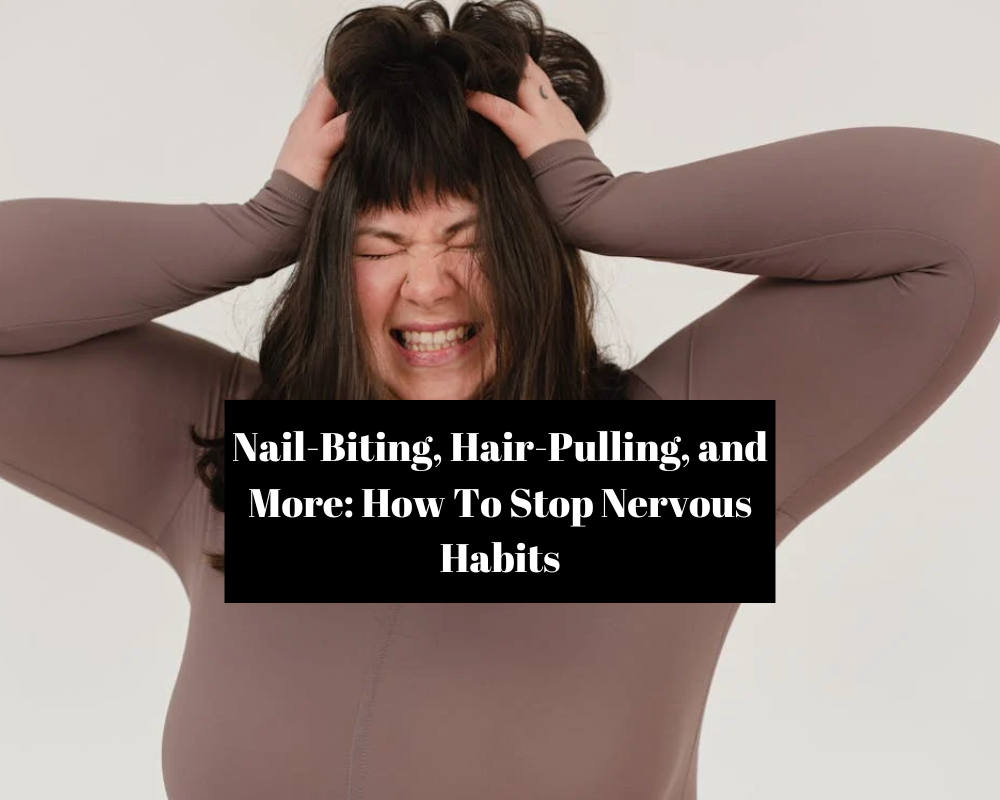Having a nervous habit that you can’t shift can be really frustrating and it can easily disrupt your life. From biting your nails through to emotional eating, many of us struggle with nervous habits, but that doesn’t mean we should have to put up with them, as there are ways to overcome these mental health challenges. We’re here to look at some examples of nervous habits, their causes, and a few things you can do to help reduce or hopefully stop them.
Examples Of Nervous Habits
Nervous habits look different to everyone; however, here are some common examples of them:
- Overeating
- Biting nails or picking cuticles
- Grinding teeth
- Pulling at hair
- Emotional eating
- Smoking
- Cracking knuckles
Causes Of Nervous Habits: Identify Your Triggers
Many different things can cause nervous habits, with the two most common being anxiety and stress. Anything that causes apprehension or fear can lead to these feelings too, whether it’s something that you’ve not experienced before, either positively or negatively, or something stressful. Whether it’s one-off occasions that cause your nervous habits, like first dates, a job interview or a funeral, or ongoing stresses like work commitments, social anxiety or unhealthy relationships, everyone is affected differently.
So, our first piece of advice is to try and be aware of when you’re displaying your nervous habit and physically writes it down in a book with the date and any factors that you think could be causing the habit to display. By doing this, you’re becoming very aware of exhibiting the habit and its potential causes. From here, you can start to piece together what might be triggering the habit and then look at how you can resolve that stress. For example, if you exhibit your habit before meeting a certain group of friends, look at why that might be and options to help you reduce these feelings. If it’s before a temporary event, look at ways to distract yourself temporarily, as you know the feelings will pass.
Try The 3 3 3 Rule
If you find that your nervous habits are triggered by a short-term event, then try the 3 3 3 rule. This is an easy technique that can distract the mind and help you regain some focus when you start to feel overwhelmed. All you need to do is name 3 things that you see, and 3 things that you can hear and then move 3 body parts. Many people find that this can help you to move away from the consumptive feelings that stress or anxiety can cause, to help you reground and assess how you’re feeling, away from your nervous habits.
Find Replacement Options
Something else to try is finding alternative, more positive, behaviours for when you identify yourself as starting to show signs of your nervous habit. This will differ significantly depending on what your nervous habits are, but here are a few examples. If you pull your hair often, get yourself a stress ball and try that. If you bite your nails, you could have a nail strengthener applied to your nails so you can’t physically bite them, and then when you start to show the behaviour, try tapping your middle and index fingers against your thumb for some sensory stimulation. If you are prone to nervous eating, try going out for a walk, having a cup of tea, or doing something you find comforting, like having a nice hot bath. These things may seem trivial and won’t work for everyone, but they can make a big difference for some people.
Read: Clean Beauty and Cosmetic Chemistry: Finding Natural Ingredients
Speak To A Healthcare Professional
While you can try to identify your nervous habits and replace them, it’s not always possible for you to resolve them yourself, so if you’re struggling to take control of them, make sure you speak to a healthcare professional to get the help you need. They will be able to help you and it can make a big difference.
If a healthcare professional is taking a bit of time to see you, you could try and talk to someone else, like a therapist or a close friend or relative. The first stage to recovery is acknowledging the problem, and then maybe through these conversations, you can establish the route of where this nervous habit comes from. Who knows? You might be able to confide in someone who has had their fair share of trials and tribulations with their nervous habits and can give some personal tips and tricks to train your body and mind not to pick or chew on things.
Final Thoughts
We’d recommend going to your doctor and they can help you find the right path forward and may refer you to other people, for example, a therapist if you need help identifying where your habits are coming from or a local dentist in Leamington Spa if you’re grinding your teeth and need to prevent any damage from occurring. Accepting help is a key part of reducing nervous habits for many people and we hope you find the right path moving forward.



